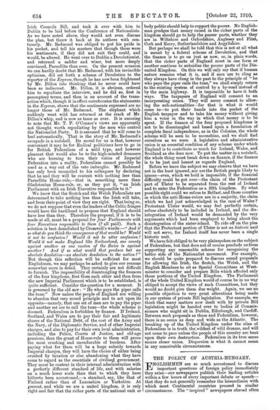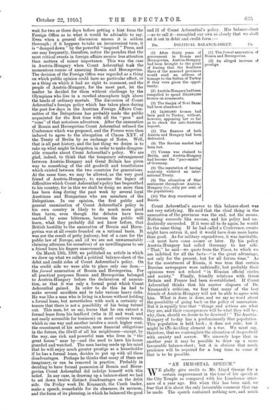THE POLICY OF AUSTRIA-HUNGARY.
ENGLISHMEN are so much accustomed to discuss important questions of foreign policy immediately they arise—our newspapers publish their leading articles within a few hours of every important debate or speech— that they do not generally remember the leisureliness with which most Continental countries proceed in similar circumstances. The " inspired " newspapers abroad often wait for two or three days before getting a hint from the Foreign Office as to what it would be advisable to say. Even when a general discussion ensues it is seldom thorough ; if it happens to take an inconvenient turn, it is " damped down " by the powerful " inspired " Press, and one may frequently, therefore, notice the paradox that the most critical events in foreign affairs receive less attention than matters of minor importance. This was the ease in Austria-Hungary when Count Aehrenthal took the momentous course of annexing Bosnia and Herzegovina. The decision of the Foreign Office was regarded as a thing on which public opinion could have no particular effect, or as a thing on which it had no right to comment, and the people of Austria-Hungary, for the most part, let the matter be decided for them without challenge by the Olympians who live in a rarefied atmosphere high above the heads of ordinary mortals. The discussion of Count Aehrenthal's foreign policy which has taken place during the past few days in the Austrian Foreign Affairs Com- mittee of the Delegations has probably made the public acquainted for the first time with all the " pros " and "cons" of that notorious adventure. After the annexation of Bosnia and Herzegovina Count Aehrenthal refused the Conference which was proposed, and the Powers were then induced to agree to the abrogation of Clause XXV. of the Treaty of Berlin by an exchange of Notes. Well, that is all past history, and the last thing we desire is to rake up what might be forgotten in order to make disagree- able remarks about Count Aehrenthal's policy. We are glad, indeed, to think that the temporary estrangement between Austria-Hungary and Great Britain has given way to something of the old goodwill and trustfulness which existed between the two countries for generations. At the same time, we may be allowed, as the very good friend of Austria-Hungary, to examine the legacy of. difficulties which Count Aehrenthal's policy has bequeathed to his country, for in this we shall be doing no more than has been donta during the past week by several loyal Austrians and Hungarians who are members of the Delegations. In our opinion, the first public and general examination of Count Aehrenthal's policy in his own country is likely to do much more good than harm, even though the debates have been marked by some bitterness, because the public will learn, what they probably did not know before, that British hostility to the annexation of Bosnia and Herze- govina was at all events founded on a rational basis. It was not the result of petty jealousy, but of a care for the public law of Europe, and (if we are not unwarrantably claiming altruism for ourselves) of an unwillingness to see a friend burn his fingers unnecessarily.
On March 13th, 1909, we published an article in which we drew up what we called a political balance-sheet of the debit and credit sides of Count Aehrenthal's policy. On the credit side we were able to place only one item,— the formal annexation of Bosnia and Herzegovina. For all practical purposes Bosnia and Herzegovina belonged to Austria-Hungary before the declaration of annexa- tion, so that it was only a formal point which Count Aehrenthal gained. In order to do this he had to make several sacrifices and to take various heavy risks. He was like a man who is living in a house without holding a formal lease, but nevertheless with such a certainty of tenure that there is not a possibility of his being turned out. This man, let us say, learns that he can extract a formal lease from his landlord (who is ill and weak and not easily accessible for business) on most curious terms, which in one way and another involve a much higher rent, the resentment of his servants, more financial obligations in the future, the illwill of all his neighbours—except, by the way, one rich and powerful man who lives in " the great house" near by—and the need to have his house guarded and watched. The man having made up his mind that he will enjoy much greater prestige as a householder if be has a formal lease, decides to put up with all these disadvantages. Perhaps he thinks that many of them are imsginary, or can be removed in practice. Probably in deciding to have formal possession of Bosnia and Herze- govina Count Aehrenthal did indulge himself with this belief. In any case, in drawing up a balance-sheet we had to set down twelve distinct disadvantages on the debit side. On Friday week Dr. Kramarzh, the Czech leader, make a speech, remarkable for its clearness, its sarcasm, and the force of its phrasing, in which he balanced the good Count Aehrenthal's answer to this balance-sheet was not very satisfying. He said that the chief thing in the annexation of the provinces was the end, not the means. Nothing succeeds like success, and his policy had un- doubtedly succeeded. If it were all to do again, he would do the same thing. If he had called a Conference, events might have outrun it, and it would have done more harm than good. As for military expenditure, it was inevitable, —it must have come sooner or later. By his policy Austria-Hungary had called Germany to her side. " That," he said—we quote from the Times, to which wo are indebted for all the facts—" is the great advantage, not only for the present, but for all future time." As for the resentment of Russia, it was true that certain Russian newspapers were unfriendly, but probably their opinions were not echoed " in Russian official circles and society." Finally, friendly relations with Great Britain and France had been re-established. If Count Aehrenthal thinks that his answer disposes of Dr. Kramarzh's criticism, we fear that many of the best friends of Austria-Hungary will not be able to agree with him. What is done is done, and we say no word about the possibility of going back on the policy of annexation. But it is equally true that " things and actions are what they are, and their consequences will be what they will be ; why, then, should we desire to be deceived ? " The Austria- Hungary of to-day has a predominantly Slav population. This population is held back ; it does not rule ; but it might be tiSa deciding element in a war. We must say, therefore, that we contemplate the alienation of its goodwill with anxiety and sorrow. We sincerely hope that in another year it may be possible to draw up a more favourable balance-sheet ; but it is obvious that much prudence will be required for a long time to come if that is to be possible. and ill of Count Aehrenthal's policy. His balance-sheet —so to call it—resembled our own so closely that we shall set it out in debit and credit form :- Ds. POLITICAL BALANCE-SHEET. Ca.
(1) After thirty years of government in Bosnia and Herzegovina, Austria-Hungary had been brought to the point of fearing that tho Southern Slays of the annexed provinces would send an address of homage to the Sultan of Turkey if they were given the oppor- tunity.
(2) Austria-Hungary hadbeen compelled to spend 300,000,000 kronen on armaments.
(3) The Sonja of Novi Bazar had been abandoned.
(4) 54,000,000 kronen had been paid to Turkey, without, however, appeasing her so far as to check the anti-Austrian boycott.
(5) The finances of both Austria and Hungary had been dislocated.
(6) The Servian market had been lost.
(7) Vienna was chained to Berlin, and Austria-Hungary had become the "pace-maker" of Germany.
(8) The reputation of having wantonly violated an inter- national Treaty.
(9) The alienation of Slav sentiment throughout Austria- Hungary (i.e., sixty per cent. of the population).
(10) The deep resentment of Russia. (1) The forma/ annexation of Bosnia and Herzegovina.
(2) An alleged increase of prestige.















































 Previous page
Previous page